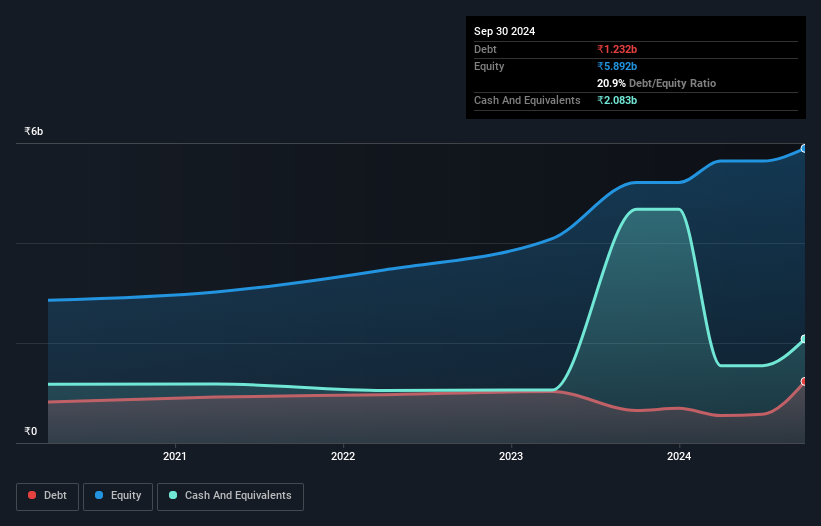- India
- /
- Electronic Equipment and Components
- /
- NSEI:RISHABH
Here's Why Rishabh Instruments (NSE:RISHABH) Has A Meaningful Debt Burden
Some say volatility, rather than debt, is the best way to think about risk as an investor, but Warren Buffett famously said that 'Volatility is far from synonymous with risk.' When we think about how risky a company is, we always like to look at its use of debt, since debt overload can lead to ruin. We note that Rishabh Instruments Limited (NSE:RISHABH) does have debt on its balance sheet. But the real question is whether this debt is making the company risky.
What Risk Does Debt Bring?
Debt is a tool to help businesses grow, but if a business is incapable of paying off its lenders, then it exists at their mercy. In the worst case scenario, a company can go bankrupt if it cannot pay its creditors. However, a more frequent (but still costly) occurrence is where a company must issue shares at bargain-basement prices, permanently diluting shareholders, just to shore up its balance sheet. Of course, debt can be an important tool in businesses, particularly capital heavy businesses. When we examine debt levels, we first consider both cash and debt levels, together.
View our latest analysis for Rishabh Instruments
What Is Rishabh Instruments's Debt?
As you can see below, at the end of September 2024, Rishabh Instruments had ₹1.23b of debt, up from ₹649.8m a year ago. Click the image for more detail. But on the other hand it also has ₹2.08b in cash, leading to a ₹850.7m net cash position.

How Strong Is Rishabh Instruments' Balance Sheet?
According to the last reported balance sheet, Rishabh Instruments had liabilities of ₹1.87b due within 12 months, and liabilities of ₹915.3m due beyond 12 months. Offsetting these obligations, it had cash of ₹2.08b as well as receivables valued at ₹1.13b due within 12 months. So it can boast ₹423.4m more liquid assets than total liabilities.
This surplus suggests that Rishabh Instruments has a conservative balance sheet, and could probably eliminate its debt without much difficulty. Simply put, the fact that Rishabh Instruments has more cash than debt is arguably a good indication that it can manage its debt safely.
The modesty of its debt load may become crucial for Rishabh Instruments if management cannot prevent a repeat of the 69% cut to EBIT over the last year. When it comes to paying off debt, falling earnings are no more useful than sugary sodas are for your health. The balance sheet is clearly the area to focus on when you are analysing debt. But it is Rishabh Instruments's earnings that will influence how the balance sheet holds up in the future. So when considering debt, it's definitely worth looking at the earnings trend. Click here for an interactive snapshot.
Finally, a business needs free cash flow to pay off debt; accounting profits just don't cut it. While Rishabh Instruments has net cash on its balance sheet, it's still worth taking a look at its ability to convert earnings before interest and tax (EBIT) to free cash flow, to help us understand how quickly it is building (or eroding) that cash balance. In the last three years, Rishabh Instruments created free cash flow amounting to 10% of its EBIT, an uninspiring performance. For us, cash conversion that low sparks a little paranoia about is ability to extinguish debt.
Summing Up
While it is always sensible to investigate a company's debt, in this case Rishabh Instruments has ₹850.7m in net cash and a decent-looking balance sheet. So although we see some areas for improvement, we're not too worried about Rishabh Instruments's balance sheet. When analysing debt levels, the balance sheet is the obvious place to start. But ultimately, every company can contain risks that exist outside of the balance sheet. Case in point: We've spotted 1 warning sign for Rishabh Instruments you should be aware of.
When all is said and done, sometimes its easier to focus on companies that don't even need debt. Readers can access a list of growth stocks with zero net debt 100% free, right now.
New: AI Stock Screener & Alerts
Our new AI Stock Screener scans the market every day to uncover opportunities.
• Dividend Powerhouses (3%+ Yield)
• Undervalued Small Caps with Insider Buying
• High growth Tech and AI Companies
Or build your own from over 50 metrics.
Have feedback on this article? Concerned about the content? Get in touch with us directly. Alternatively, email editorial-team (at) simplywallst.com.
This article by Simply Wall St is general in nature. We provide commentary based on historical data and analyst forecasts only using an unbiased methodology and our articles are not intended to be financial advice. It does not constitute a recommendation to buy or sell any stock, and does not take account of your objectives, or your financial situation. We aim to bring you long-term focused analysis driven by fundamental data. Note that our analysis may not factor in the latest price-sensitive company announcements or qualitative material. Simply Wall St has no position in any stocks mentioned.
About NSEI:RISHABH
Rishabh Instruments
Engages in the design, development, and manufacturing of global energy efficiency solutions in electrical automation, measurement, and industrial technology in Asia, the United States, Poland, other European countries, and internationally.
Flawless balance sheet with proven track record.
Similar Companies
Market Insights
Weekly Picks


Crazy Undervalued 42 Baggers Silver Play (Active & Running Mine)


Fiducian: Compliance Clouds or Value Opportunity?

Willamette Valley Vineyards (WVVI): Not-So-Great Value
Recently Updated Narratives


The "Molecular Pencil": Why Beam's Technology is Built to Win


ADNOC Gas future shines with a 21.4% revenue surge

Watch Pulse Seismic Outperform with 13.6% Revenue Growth in the Coming Years
Popular Narratives


MicroVision will explode future revenue by 380.37% with a vision towards success


NVDA: Expanding AI Demand Will Drive Major Data Center Investments Through 2026





